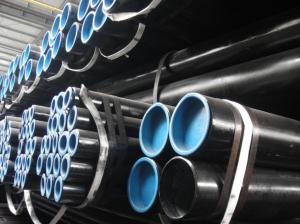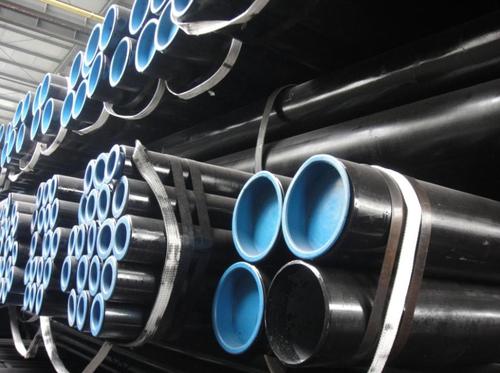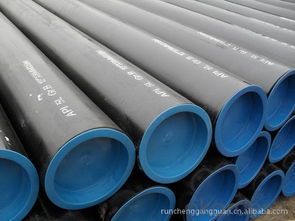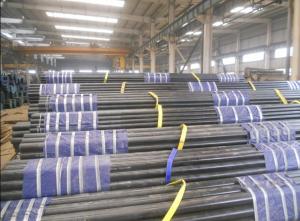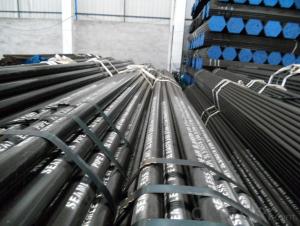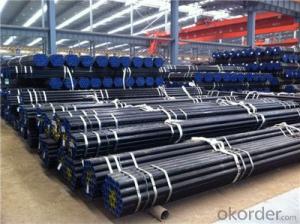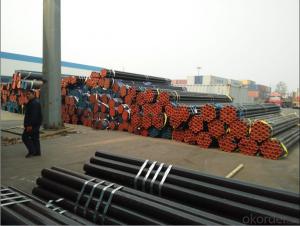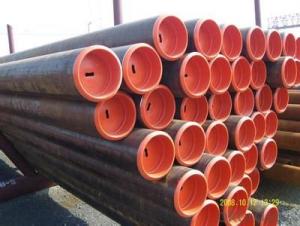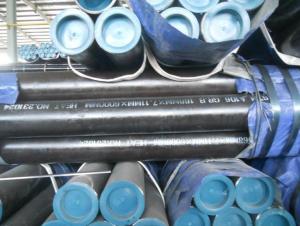Carton Seamless Steel Pipe Hot Sales of 3''-10''
- Loading Port:
- China Main Port
- Payment Terms:
- TT or LC
- Min Order Qty:
- 25 m.t.
- Supply Capability:
- 1000 m.t./month
OKorder Service Pledge
OKorder Financial Service
You Might Also Like
Product Description:
1、Structure of Carton Seamless Steel Pipe Hot Sales of 3''-10'' Description:
Seamless pipe is formed by drawing a solid billet over a piercing rod to create the hollow shell. As the manufacturing process does not include any welding, seamless pipes are perceived to be stronger and more reliable. Historically seamless pipe was regarded as withstanding pressure better than other types, and was often more easily available than welded pipe.
2、Main Features of the Carton Seamless Steel Pipe Hot Sales of 3''-10'':
• High manufacturing accuracy
• High strength
• Small inertia resistance
• Strong heat dissipation ability
• Good visual effect
• Reasonable price
3、Carton Seamless Steel Pipe Hot Sales of 3''-10'' Images:
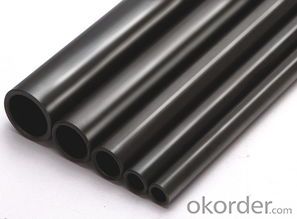
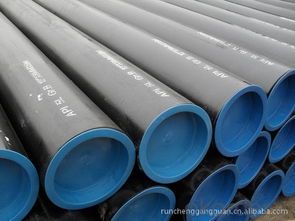
4、Carton Seamless Steel Pipe Hot Sales of 3''-10'' Specification:
1. Commodity Name: Seamless steel pipe
2. Standard: API,GB,ASTM,ASME,DIN
3. Quality grade: 10#, 20#, A106B, A53B, API 5L B, Q235, Q345, ST37-2, ST 45, ST52.etc.
4. Dimension:
OD: 1/2"-24"
WT: 2.5-80mm, SCH10~SCH40~XXL
length: 5.8m,6m,8m,9m,12m
5. Technique: Hot Rolled/Cold Rolled/ Cold Drawn
6.packing and shipment
Packaged in bundles,as per customers' requirements, it can also bepackagesd as beveled ends, typed marking, black painting, plastic caps protection,woven bags packing
For 20" container the max length is 5.8m; For 40" container the max length is 12m. other options are available based on customer requests. Please discuss when placing orders.
5、FAQ of Carton Seamless Steel Pipe Hot Sales of 3''-10'':
①How is the quality of your products?
Our products are manufactured strictly according to national and internaional standard, and we take a test
on every pipe before delivered out. If you want see our quality certifications and all kinds of testing report, please just ask us for it.
Guaranteed: If products’ quality don’t accord to discription as we give or the promise before you place order, we promise 100% refund.
②How about price?
Yes, we are factory and be able to give you lowest price below market one, and we have a policy that “ for saving time and absolutely honest business attitude, we quote as lowest as possible for any customer, and discount can be given according to quantity”,if you like bargain and factory price is not low enough as you think, just don’t waste your time.Please trust the quotation we would give you, it is professional one.
③Why should you chose us?
Chose happens because of quality, then price, We can give you both.Additionally, we can also offer professional products inquiry, products knowledge train(for agents), smooth goods delivery, exellent customer solution proposals.Our service formula: good quality+good price+good service=customer’s trust
SGS test is available, customer inspection before shipping is welcome, third party inspection is no problem.
Any question, pls feel free to contact us !
- Q: What are the different methods of pipe threading for steel pipes?
- There are three main methods of pipe threading for steel pipes: manual threading, machine threading, and roll grooving. Manual threading involves using a handheld threader to create threads on the pipe. Machine threading is done using a power-driven threading machine that automates the threading process. Roll grooving is another method where grooves are formed on the pipe by using a specialized machine, which allows for the connection of pipes using mechanical couplings. Each method has its advantages and is chosen based on the specific requirements and preferences of the project.
- Q: Outside diameter 60, thickness 3.5 seamless steel tube, how many kilograms per meter?
- Outside diameter 60mm, thickness 3.5mm seamless steel tube per metre weight: 4.88 kg. When calculating the theoretical weight (Kg/m) per metre of steel tube, the theoretical weight meter of the steel tube can be checked directly, and the formula formula can also be used.
- Q: What is the composition of steel pipes?
- Steel pipes are primarily composed of iron and carbon, with trace amounts of other elements such as manganese, phosphorus, sulfur, and silicon.
- Q: How are steel pipes used in the oil and gas pipeline transportation?
- Steel pipes are widely used in the oil and gas industry for pipeline transportation due to their durability, strength, and resistance to corrosion. These pipes are specifically designed to withstand high pressure and transport various types of fluids, including crude oil, natural gas, and refined petroleum products. In oil and gas pipeline transportation, steel pipes are primarily used for three main purposes: gathering, transmission, and distribution. Gathering pipelines are responsible for collecting oil and gas from the production wells and transporting them to processing facilities. Steel pipes are used in these pipelines due to their ability to withstand the harsh conditions of the extraction sites and effectively transport the fluids over long distances. Transmission pipelines are used to transport oil and gas over vast distances, sometimes spanning across countries or continents. Steel pipes are ideal for this purpose as they can handle high pressure, ensuring the efficient flow of fluids over long distances. These pipes are often buried underground or submerged in water to protect them from external elements and minimize the risk of damage. Distribution pipelines are responsible for delivering oil and gas to end-users, such as homes, businesses, and industrial facilities. Steel pipes are commonly used in these pipelines as they can handle the varying demand and pressure requirements of different consumers. These pipes are often smaller in diameter compared to transmission pipelines but still provide reliable and safe transportation of oil and gas to their final destinations. In addition to their strength and durability, steel pipes used in oil and gas pipeline transportation are also coated or lined with various materials to enhance their resistance to corrosion and minimize the risk of leaks. These protective coatings and linings ensure the longevity of the pipes and maintain the integrity of the transported fluids. Overall, steel pipes play a crucial role in the oil and gas industry by providing a reliable and efficient means of transporting oil and gas from production sites to processing facilities and ultimately to end-users. Their durability, strength, and resistance to corrosion make them an ideal choice for pipeline transportation in this industry.
- Q: Can steel pipes be used for transporting gases and liquids?
- Yes, steel pipes can be used for transporting gases and liquids. Steel pipes are known for their high strength, durability, and resistance to corrosion, making them an ideal choice for transporting various substances. Additionally, steel pipes have the ability to withstand high pressure and temperature, making them suitable for a wide range of applications in industries such as oil and gas, water supply, and chemical processing.
- Q: What is the role of steel pipes in the chemical manufacturing industry?
- Steel pipes play a crucial role in the chemical manufacturing industry as they are widely used for transporting various chemicals, gases, and liquids. These pipes are highly durable, resistant to corrosion, and can withstand high temperatures and pressures, making them ideal for handling hazardous substances. Additionally, steel pipes ensure the integrity and safety of the chemical manufacturing process by preventing leaks, contamination, and loss of product.
- Q: How do steel pipes handle water hammer?
- Steel pipes handle water hammer by absorbing the sudden pressure surges caused by rapid changes in water flow. The inherent strength and rigidity of steel pipes allow them to withstand the impact of water hammer without experiencing significant damage or failure.
- Q: Can galvanized pipe be welded with seamless steel tube? What should I do to connect?
- See the galvanized pipe and seamless steel pipe steel that differences in how if the difference is too large then the steel used for two kinds of materials for welding requirements is not the same, do not recommend direct welding, low pressure can be used in high voltage wire, welding on both sides of the same material flange with flange connection.
- Q: How are steel pipes used in the construction of railway tracks?
- Steel pipes are commonly used in the construction of railway tracks as they provide a strong and durable foundation. These pipes are usually used as support structures for the tracks, serving as a base on which the rails are laid. They help to distribute the weight of the trains evenly, ensuring stability and reducing the risk of track failure. Additionally, steel pipes are used for drainage purposes, allowing water to flow freely and preventing damage to the tracks.
- Q: What is the difference between steel pipes and ductile iron pipes?
- Steel pipes and ductile iron pipes are both commonly used for various applications in the construction industry, but they differ in their composition and properties. Steel pipes are primarily made from an alloy of iron and carbon, with small amounts of other elements. They are known for their high tensile strength and durability, making them suitable for transporting fluids and gases under high pressure. Steel pipes are more resistant to corrosion than ductile iron pipes, and they can withstand extreme temperatures and environmental conditions. On the other hand, ductile iron pipes are made from an alloy of iron, carbon, and small amounts of other elements like silicon and magnesium. These pipes are characterized by their high strength, impact resistance, and flexibility. Ductile iron pipes are often used for water and sewage transportation due to their corrosion resistance and ability to withstand ground movement and heavy loads. In summary, steel pipes are known for their strength, durability, and corrosion resistance, while ductile iron pipes offer greater flexibility and impact resistance. The choice between the two depends on the specific application requirements and environmental conditions.
Send your message to us
Carton Seamless Steel Pipe Hot Sales of 3''-10''
- Loading Port:
- China Main Port
- Payment Terms:
- TT or LC
- Min Order Qty:
- 25 m.t.
- Supply Capability:
- 1000 m.t./month
OKorder Service Pledge
OKorder Financial Service
Similar products
Hot products
Hot Searches
Related keywords
